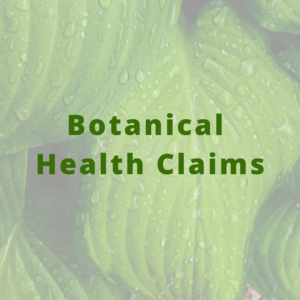 The European Commission (@Eu_Commission) have published a working document which evaluates the current regulations regarding nutrient profiles and health claims made on plants and their preparations and of the regulation of the use of such substances in foods.
The European Commission (@Eu_Commission) have published a working document which evaluates the current regulations regarding nutrient profiles and health claims made on plants and their preparations and of the regulation of the use of such substances in foods.
The current On-hold claims situation on botanicals in Europe:
According to claims regulation, health claims made on foods, including plants and their preparations, should only be authorised after a scientific assessment by the European Food Safety Authority (EFSA), where human intervention studies are required. In 2009, not a single health claim for plants in foods received a favourable assessment by EFSA, where this was mainly due to the absence of human intervention studies. In 2012, the European Commission (EC) established an On-hold’ list of 2,078 health claims relating to plants. This list has benefited food business operators as they have been able to continue using health claims on plants without having to run clinical trials to support their health claim applications. This benefit comes with a cost to consumers as they continue to be exposed to unsubstantiated health claims.
With this in mind, the EC working document assesses the impact of this long unregulated list of health claims. The evaluation examines whether the current non-implemented rules concerning the authorisation of health claims on plants and their preparations used in foods are adequate, and whether adapting the rules of the Claims Regulation to recognise “traditional use” for the substantiation of health claims for botanicals would ensure the objectives of the Claims Regulation are met. The interaction of the use of health claims on plants and their preparations with the current applicable food safety regulatory framework is examined, including the possible need for safety requirements for the use of plants and their preparations in food.
The EC working document also assesses the impact of the absence of nutrient profiles in Europe. Nutrient profiles are thresholds of nutrients such as fat, sugars and salt above which nutrition and health claims are restricted or prohibited. They aim to prevent positive health messages on foods which are high in fats, sugars and/or salt content. For example, in Australia, a health claim must not be made for a food unless the food meets the NPSC (the nutrient profiling scoring criterion). It is worth noting that food supplements will likely not be impacted from this as they are typically low in fat, sugar and salt. Although Article 4 of the Claims Regulation envisaged the adoption of nutrient profiles by the 19th of January 2009, nutrient profiles are still not established at EU level. The EC’s evaluation assesses whether nutrient profiles are still fit for their purpose, warranted and adequate to ensure the objectives of the Claims Regulation are met
In line with the Better Regulation Guidelines, the evaluation considers the impact of the Claims Regulation with regard to its effectiveness, efficiency, relevance, coherence and EU added value. The results of this evaluation will be used to inform the Commission’s reflection on this topic.
The full working document can be accessed here:
#community #botanicals #onholdclaims #nutrientprofiling #healthclaimregulation



